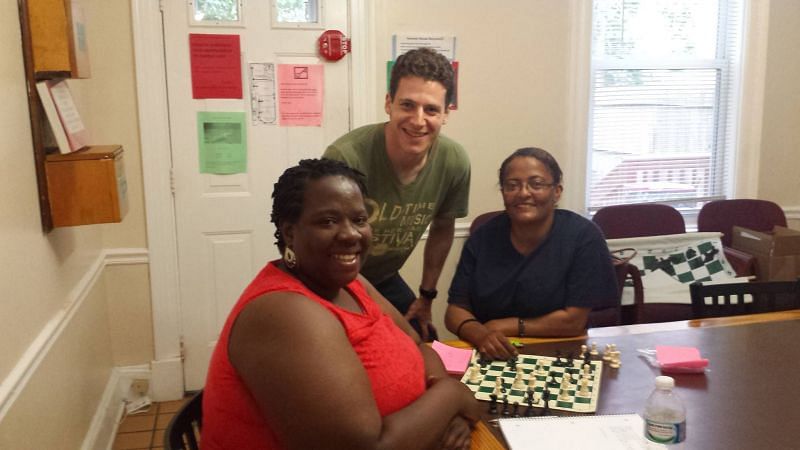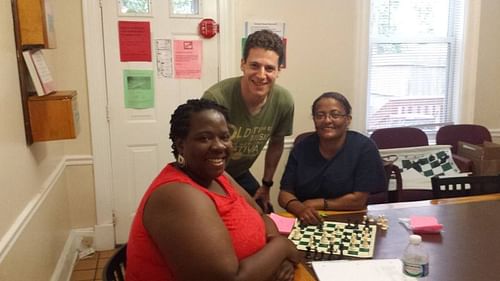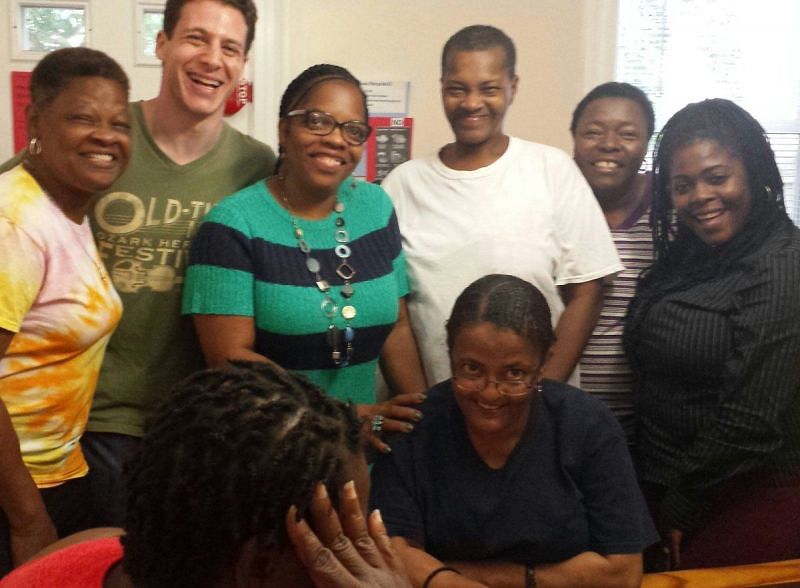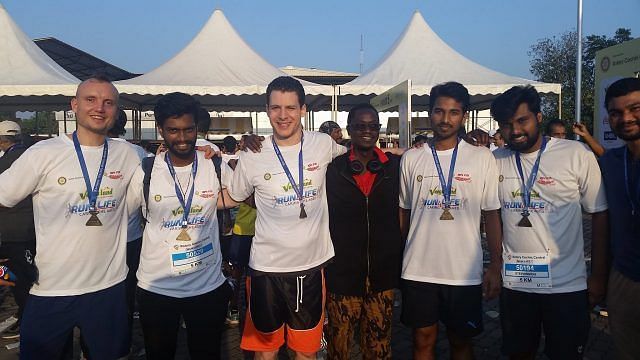
Empowering communities through chess: In conversation with National Master David Bennett

David Bennett is an American National Chess Master. He is one of the few players in the world who have taken chess as a way to improve local communities, using the force of the game to empower society.
With his passion for chess and the development sector, he finds himself not just competing for the biggest titles in the mind sport but also tirelessly working in the field of social development.
In this interview, David Bennett describes his unique journey in chess and his work in social entrepreneurship through the game.
1. Can you please introduce yourself?
DB: Thank you for the invitation to interview with Sportskeeda. I am a US National Master of chess and a coach based in Washington, DC. I've trained two DC Champions, a World Open winner and a US Junior Grand Prix winner. I've also volunteered with various organisations to make an impact in the community with chess and to ensure that the benefits of the Royal Game are accessible to all.
2. How did you get into chess? What are some early memories that you have of your career?
DB: I originally learned the game at quite a young age, around 5, from my father, though I didn't take it up in earnest until I was in my teens. My dad and brother were playing a lot and that naturally got my competitive gears turning. I played on the old site World Chess Network, watched lectures, voraciously read books and developed a knack for the game. My parents would sometimes catch me playing online in the middle of the night as I hadn't yet learned the importance of balance! I began playing in a local chess club in my home town.
Then, I met a coach who encouraged me to play in tournaments. I think the fact that I didn't get into the game till around high school (13-14 years old) was a plus because my enthusiasm was just beginning to grow, whereas sometimes people who begin competing too young grow tired of the game. I'm not sure that would have happened (perhaps early competition benefits those who achieve the very highest titles) but the timing seemed to be good.
My parents were very supportive of my career and my dad would travel with me to big national tournaments like the US Open, World Open and the Global Chess Challenge. I combined my chess skills with my high school wrestling career, and I think the blend was excellent for my development in terms of independence, mental toughness, introspection and resilience.
3. Take us through your journey of obtaining the National Master title.
DB: Obtaining the National Master title was definitely not a linear endeavour! As I mentioned, I began my chess career a bit later than most youth players, and by the time I began competing, my career took off pretty quickly, and I was gaining hundreds of Elo (rating) points per year, finally moving up to top 100 in the US under 18 and obtaining the expert title (2000 national rating) just around the time that I graduated from high school.
Given that I felt my upward trajectory was continuing, and that once I began to study at the University of Michigan it would be difficult to continue competing, I decided to take a gap year to really have a go at my chess career. I had the chance to play in a few international competitions during that year (Latin America and Eastern Europe in addition to a few major events across the US).
At first, I was getting trounced by international competition, but it strengthened me. After some strong performances in Costa Rica and Serbia, where I defeated my first International Masters, I ended up surpassing 2200 FIDE (International Chess Federation). However, because the majority of my competition that year was international, my US rating remained in the mid-2100s, and a 2200 rating is required for the US National Master title.
Then came college. I've found it interesting that taking a step back from chess, as well as internalising new thinking models from different disciplines that one learns in college and the workplace, can actually improve one's chess. I recall playing in the New York State Championship one year, 2012 I think, and actually having one of my better tournaments.
So fast forward several years... I did various internships during college (even one in beautiful rural India) when the Great Recession hit. I got a scholarship and went to grad school studying urban planning and public administration, did a year of service for military families in Missouri with AmeriCorps VISTA and ended up in DC as a caseworker with the city's homeless community as they were transitioning into housing and struggling with severe mental illness. I am grateful for these experiences as they helped to shape who I am and broadened my horizons. I couldn't simply have a singular focus on chess.
And yet the chess bug bit again! Funny enough, it began with online chess again. I was that guy in the building who would be playing chess (and Scrabble for cross-training) in the business centre. So, I got back into competition and ran into a college friend and president of my university's chess club at the 2014 World Open. He told me that he taught chess for a living and happened to be living in the DC area as well. I did find the option intriguing, so I threw in an application to teach at a local organization that offers chess instruction in schools. I was accepted, and from 2015 onward, chess has been my occupation.
Some say that coaching hurts one's game, but I did have that deep immersion in the game, and I had my chance to take another shot at the National Master title. It would be a lifetime achievement. I had to do it. I was actually still within shooting distance of the title. So, I got back into regular competitions. The Arlington Chess Club just south of DC in Virginia offered plenty of opportunities for small events against solid masters and experts.
Finally, in the spring of 2016, I drew against a Grandmaster and then beat a National Master to break through the 2200 US rating. I remember my roar of joy on my drive home. I wrote a blog entry in which I encapsulated everything that it took to obtain the master title, and it seems that others with similar ambitions have found it useful.
4. What were some of the most memorable moments in your chess career?
DB: Apart from the above, I have a particularly memorable experience from the historic Marshall Chess Club in New York City. I lost my first three games. Many would withdraw from the tournament at that point, but that's not what I do. Similar to achieving the NM title, I knew I could do it; I just had to make the right adjustments.
Essentially what I did was wrote out a multiple-page kind of stream-of-consciousness evaluation from which I boiled down some essential points that could be applied going forward. The thing is that when you make an error, you know what went wrong if you have any degree of self-awareness. I almost tried to go back and replay my thought process at the critical moments that I made mistakes. And above all, I just needed to keep my time management in check.
So, I also created a strict schedule for myself, dividing up the number of moves by the time control and ensuring that I stayed well within it. I applied all this, and it worked. I won 5 of my following 6 games. With a finish of 5/9, I turned a could-have-been-disaster into a solid tournament which felt like a great victory on a personal level.
I condensed the lessons I learned from that formative event into a list of reminders that I review before every single tournament game now. This was actually one of the biggest things that helped me to break through to the National Master title.
Self-awareness is everything. It's not what you shouldn't do; it's to invert that and turn it into positive reinforcement which becomes a habit. I suppose this would fall under "positive psychology" and, combined with a dose of realism, I think it's good. This turns weaknesses into strengths. I plan to write a book on this topic where I reveal the maxims I've created. They will be different for everyone, but perhaps I could provide a road map. In summary: know thyself. Chess is one fascinating way of achieving this.

5. You obtained a Bachelors and Masters Degree from prestigious US universities. Can you please talk about your experience in both?
DB: I went to the University of Michigan and got a dual bachelor's degree in history and political science, then decided to return to Los Angeles and obtained a dual master's degree in urban planning and public administration from the University of Southern California.
Going to school in Ann Arbor, Michigan was a great experience. It is also quite diverse and international, so it's an excellent place to gain new perspectives. I concentrated on world history and international politics. I received a grant to research with several students in Thailand after my first year and had the chance to visit India as well, seeing my friend in Kolkata and backpacking solo from Maharashtra to Himachal Pradesh for a couple more weeks where I tried my hand at recycling dry waste.
I was so inspired by the country that I returned after my sophomore year to work on a rural development program in Rajgurunagar, near Pune, with the great organisation Bombay Mothers and Children Welfare Society. I was also able to do an internship in Washington, DC, with an organisation called Common Cause, which is devoted to reforming the way elections are financed in America in order to root out corruption.
Ann Arbor is near Detroit, so I got involved in the city as well, doing a documentary called "Voices of Detroit" with an urban planning think-tank I co-chaired and mentoring middle schoolers through an initiative of the school's multicultural office. I lived in Detroit for a summer after graduating in 2010 to organise restaurant workers and coordinate with various religious leaders throughout the city.
All of these experiences helped me to empathise with people from various walks of life. In other words, it was a lot more than just the classes for me. And as I mentioned, I couldn't just do chess. I value a 360-degree, holistic approach to life. And these formative experiences inform what I do now with chess in the community.
As for USC, this was essentially my "homecoming" and helped me to see Los Angeles like I never had before. I gained experience with city and county agencies, as well as coordinating community efforts in South Los Angeles, then worked with a community foundation for my last year processing scholarships and helping donors to assess and decide to give to the causes they cared about.
It was interesting because there were people like me who recently came out of college in the program as well as those who had been working in their field for over a decade. The program was highly interdisciplinary as well. The integrated and hands-on approach was highly valuable to me. Education must be about more than time in a classroom or laboratory. I take the same approach to chess. You can't just follow one school of thought. You must be flexible. Orthodoxy and rigidity are not in accord with the pursuit of truth, which is ultimately what every chess battle is about.
6. Talk about your journey of coming to India for chess. Also, how did you evolve into a social entrepreneur?
DB: On my third journey to India, I came to experience India's deeply historic chess scene. A friend of mine, GM Timur Gareyev, informed me of this circuit of back-to-back events that were being held in cities such as Chennai, Bhopal, New Delhi, and Mumbai. I couldn't resist and it was during winter break when I would not have much teaching activity, so I made it work.
I had always wanted to experience Southern India and had my chance when I began the trip by meeting Timur in Cochi, Kerala, where we did a 5k run. It was a fun way to start the trip. I then played in two tournaments, Bhopal and Mumbai. Bhopal is a fascinating historic city. After experiencing Bhopal, I had the chance to visit the community in which I worked a decade earlier in Rajgurunagar, near Pune. It was a lot of fun, a great challenge and an honour to be playing chess in the country where it all began. I think Indian chess has a very bright future.
As for social entrepreneurship, a variety of factors coalesced. When I began teaching in 2015, I had to make sure I could make this work logistically. By early 2016, I posted a blog pledging my intention to provide chess as a service to the community. I would blend my love for service with chess. It turned out that chess was not just some petty game but rather an amazing intellectual tool to develop people's minds: their logic, their analytical and strategic thinking, their patience, and even their self-esteem. Students learn from a young age to objectively assess complex scenarios in front of them and to make independent judgment calls. Meanwhile, it keeps ageing minds sharp and agile. Not to mention that it's a whole lot of fun.
I ended up teaching at transitional housing for women and senior housing at first through a great DC-based organization called So Others May Eat. Then, I was introduced to Robin Ramson of Chess Girls DC and have been teaching with her wonderful organization ever since.
Given that women are vastly underrepresented in this mind-sport, I think it's important to provide a resource like Chess Girls DC which is specifically designed to help bridge that gap. I have also taught military families at a nearby base, provided free or subsidized lessons to students in need, and supported causes online.
For instance, I crowdfunded to help send my students who won the DC Championship to Orlando, Florida, to play against champions from across the nation. I've also taken the focus away from scholastic a bit for the summer by doing an Adult International Zoom Class in which I offer chess classes to any adult globally who would like to improve their game. So far, I have students from India, the US, Nigeria and Ireland. I am beginning now to crowdfund for Chess in Slums, which will provide a student in Nigeria with a laptop, chess programs, access to tournaments as well as personal mentorship.

7. What advice could you give to others you aspire to be better chess players or entrepreneurs?
DB: My students who have gone the farthest have been self-starters. Don't just wait for instruction. Pick up a book and have at it! This requires deep intrinsic motivation. No one can convince you to do this. Chess must be your joy, not work that becomes burdensome. Explore your curiosity, try to arrive at the truth of the game. Journal. This may be in the form of your own game analysis but make sure to write down something about what you're learning along your journey. And remember to blend the quantitative with the qualitative.
Computers, for instance, are wonderful aids. They show us great moves and profound lines of play but they don't necessarily show us the Why. Be holistic, be eclectic, and be balanced. And as my coach GM Varuzhan Akobian said growing up, "You gotta risk if you wanna drink champagne." It all boils down to my top maxim: put everything into every game.
It's a simple but powerful reminder to avoid just playing too casually or routinely. And this transfers into a life maxim: put everything into everything you do. So simple but so easy to forget as we can just let the days till by. And do it with love and with zest. Maybe that goes for (aspiring) entrepreneurs, as well.
8. What are your future goals?
DB: I've followed my heart so far in life, and I don't plan on changing that when it comes to future plans. I began early this year pursuing a certification in environmental monitoring from a Canadian university. My aim is to combine my current degrees with this certification in order to begin work in the environmental monitoring field.
I'd like to do more hands-on work, something specifically in protecting rivers and forests. It dovetails with my urban planning interest as I love mapping (the equivalent to navigating pawn structures). What I'm hoping to do is transition part-time into this field while continuing to teach chess. Meanwhile, I'm raising a family, and that will always come first.
9. How do you see the chess world evolving from here?
DB: Hmmm... that's a tough one, but I'll try to keep this one short! Clearly, computers are a big part of it. I recommend Kasparov's "Deep Thinking." In it, he talks about how we still have uniquely human qualities that give us the edge over computers in some ways and we can also utilise them as partners, essentially. I think we'll see this continued development.
I hope that Fischer Random Chess or Chess 960 continues to expand. Everything is the same strategically, the pieces are just randomly placed. So you have to think independently from move 1. No time for regurgitation of pre-studied moves! I also hope to see the continued proliferation of chess to parts of the world that have received less attention in recent decades. Players can help drive this.
I read that Magnus Carlsen is the first sitting World Champion to play chess in West Africa, which is an important start. FIDE and philanthropists can help, too, since we saw how Sinquefield decided to make chess big in the middle of America and it worked, given the strategic investment. I also hope that chess becomes an official Olympic sport. Whatever happens, chess is not a fad like some games that come and go. It's timeless.